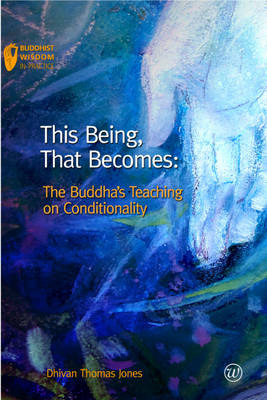
This Being, That Becomes
Windhorse Publications (Verlag)
978-1-899579-90-7 (ISBN)
This being, that becomes; from the arising of this, that arises.A" This succinct formula, recorded in texts and carved in inscriptions throughout the Buddhist world, is said to summarise the whole of the Dharma, the teaching of the Buddha. But how can such a simple summary be the conceptual formulation that characterises the experience of a Buddha, an 'Awakened One', a state beyond all words and concepts? Dhivan Thomas Jones tells us how, and takes us into the heart of the Buddha's insight that everything arises in dependence on conditions. With the aid of lucid reflections and exercises he prompts us to explore how conditionality works in our own lives, and provides a sure guide to the most essential teaching of Buddhism.
Thomas Jones was ordained into the Triratna Buddhist Order in 2004, receiving the name Dhivan, meaning 'thoughtful' or 'intelligent'. At Lancaster University he obtained a BA in Religious Studies and a PhD in the philosophy of love. He also has a degree in Pali and Sanskrit from the University of Cambridge and teaches courses in the arts for the Open University. Sagaraghosa is a renowned teacher of Buddhism and meditation. She currently leads courses in meditation and Buddhism in Cambridge.
Preface and acknowledgements Introduction: Buddhism and Conditionality - 'Those things conditionally arisen - ' - A presentation of conditionality - How to use this book Part 1: Core Teachings on Conditionality Chapter 1: The Principle of Conditionality - The fundamental principle of the Dharma - A vision of human existence - The Dharma as a practical teaching - An example - stress - The difference between 'causes' and 'conditions' - Conditionality as a transcendental principle - The difficulty of the Dharma Chapter 2: The Scope of Conditionality - The conversions of Sariputta and Moggallana - Reactive mind and creative mind - The four noble truths - Dukkha and its origin in craving - Cessation and the path - Mindful awareness as the hinge Chapter 3: The Twelve Links - The twelve nidanas in the Pali canon - The Wheel of Life and the three-life interpretation - The twelve nidanas as explaining dukkha - Ignorance, formations, consciousness and name-and-form - The six sense realms, contact, feeling, and craving - Clinging, existence, birth and ageing-and-death Chapter 4: The Spiral Path - The factors of the 'spiral path' - Opening stages of the path - The path from joy to insight - Insight, liberation and awakening - Two images for the path - How to approach the path Part 2: The Implications of Conditionality Chapter 5: Karma, Conditionality and Ethics - The Buddha's teaching of karma - Karma as intention - Karma, defilements and character - Karma and ethics Chapter 6: Conditionality as Middle Way - The middle way as a lifestyle - The extremes of indulgence and self-mortification - The middle way between existence and non-existence - Eternalism and annihilationism Chapter 7: The Nature of Existence - All conditioned things are impermanent and unsatisfactory - All things are without self - Proliferation and conflict - The conditioned and the unconditioned Chapter 8: Emptiness and Interdependence - Conditionality as 'emptiness' - Mutual interpenetration - The 'poetry of interconnectedness' - Interdependence and conditionality Appendix: 24 Nidana Reflection - Introductory note - Part 1: the spiral path - Part 2: the cyclic nidanas - Part 3: the spiral path (concluded) - Concluding note: - Pronounciation Guide for Pali and Sanskrit Words - Glossary of Pali and Sanskrit Buddhist terms - Notes and References
| Reihe/Serie | Buddhist Wisdom in Practice ; No. 2 |
|---|---|
| Zusatzinfo | Illustrations |
| Verlagsort | Cambridge |
| Sprache | englisch |
| Maße | 156 x 234 mm |
| Themenwelt | Geisteswissenschaften ► Religion / Theologie ► Buddhismus |
| ISBN-10 | 1-899579-90-7 / 1899579907 |
| ISBN-13 | 978-1-899579-90-7 / 9781899579907 |
| Zustand | Neuware |
| Haben Sie eine Frage zum Produkt? |
aus dem Bereich


